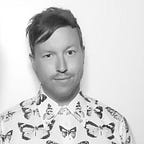Rotimi Agbabiaka’s ‘Type/Caste’ Sheds Light on Racism in the Acting World
The life of a working actor can be incredibly difficult. To get a job, you have to audition amongst many in hopes of being selected as the right choice for the role. For San Francisco actor Rotimi Agbabiaka, it’s a subjective selection process that provides insights into this country’s perception about race, gender and sexuality.
“I think the purpose of art is to expand our consciousness as a society and as individuals,” Rotimi said over coffee at Borderlands in the Mission. “But in casting, the criteria aren’t necessarily who has a performance that could expand our consciousness. A lot of times those decisions reflect ideas about race that limit certain people based on how they look.”
“It’s become so easy for someone in casting to say a black person cannot be a romantic lead or a black person could never be a romantic figure,” he continued. “They’re always the outlier, the strange exotic one, the best friend, the villain or just a backdrop for the protagonist who is usually white, male and heteronormative.
“So I wanted to explore how that specific brand of exclusion functions and how it affects the artists who want to express themselves in this art form.”
His curiosities around casting and race since moving to San Francisco in 2010 led him to create “Type/Caste,” his one-man show appearing June 10–11 at the African American Art & Culture Complex. Rotimi will transform from character to character through monologue, song, dance and drag to embody, explore and expose the battles minority artists fight in the exclusive world of mainstream American theater.
Many of the parts in “Type/Caste” are biographical, but Rotimi will also reinterpret particular instances he discovered after interviewing black Bay Area actors for a series called “Acting While Black” for Theatre Bay Area Magazine. As he explained their shared frustrations to me, his voice becomes more emboldened and passionate. I asked if “Type/Caste” was a chance to vent his anger over the lack of diversity in western art, but he assured me that wasn’t the case.
“I wouldn’t call it a venting session,” he said. “I think it’s a chance for me in a variety of mediums to ask questions about the functions of art in society and how can that function be fulfilled if we subject our art to the most closed-minded ways of seeing the world.”
His questions are incredibly timely as diversity in theater and the arts is a national hot topic. The Academy Awards yet again felt the wrath of the #OscarsSoWhite hashtag. Hollywood continues to face scrutiny over routinely casting white actors in Asian roles. CBS recently faced backlash for claiming diversity existed in six of its new TV shows that were all led by straight white males.
For Rotimi, the play is a chance to get beyond the intellectual articles about race in the arts he sees on his friend’s Facebook pages and share an experience where he and the audience can make sense of it all.
“I remember growing up in Nigeria, and our class read ‘Heart of Darkness’ by Joseph Conrad,” he began. “It was about a white man from England that came to the Congo during a time of Colonialism in the 19th century. The term heart of darkness was meant to represent him descending into the depths of human darkness. His narrative of entering the jungle and seeing the Africans describes them in animalistic ways.
“When you’re that young, you don’t realize that those people, those animalistic savages are supposed to be you. We all identified with the white protagonist and thought, ‘Oh my god, I hope he survives and those monsters don’t eat him!’ But then I grew older and realized that those savages were supposed to be me. That’s my role in this narrative. And on top of that, queer people in the arts were always portrayed as perverts or mentally ill. So these kinds of storytelling do a lot of damage to the psyche of a young, black child.”
When it comes to addressing lived experiences in his piece, he’s thankful that San Francisco and the Bay Area offer so many opportunities to explore these difficult subjects through the arts.
“I think in some ways San Francisco is not necessarily connected to what’s happening in the mainstream, which can be both good and bad,” Rotimi mused. “I think it’s good, because it’s a place where people are allowed to do the most outrageous things and take risks without worrying about never working again. But it’s bad that it can attract so many people that in turn replaces the adventurous artists who provide such mind expanding, world expanding gender-bending art that challenges every notion of what is normal and what is right or what’s valid.”
Rotimi hopes that “Type/Caste” can help question our value system and ensure respect is placed upon the many creatives who may feel overlooked.
“I want to have someone in the audience feel these experiences and understand the desire for inclusion in the more expanded version of humanity,” he said.
Note: This article originally appeared on Ripple.co, which has been acquired and now appears on Hoodline.
